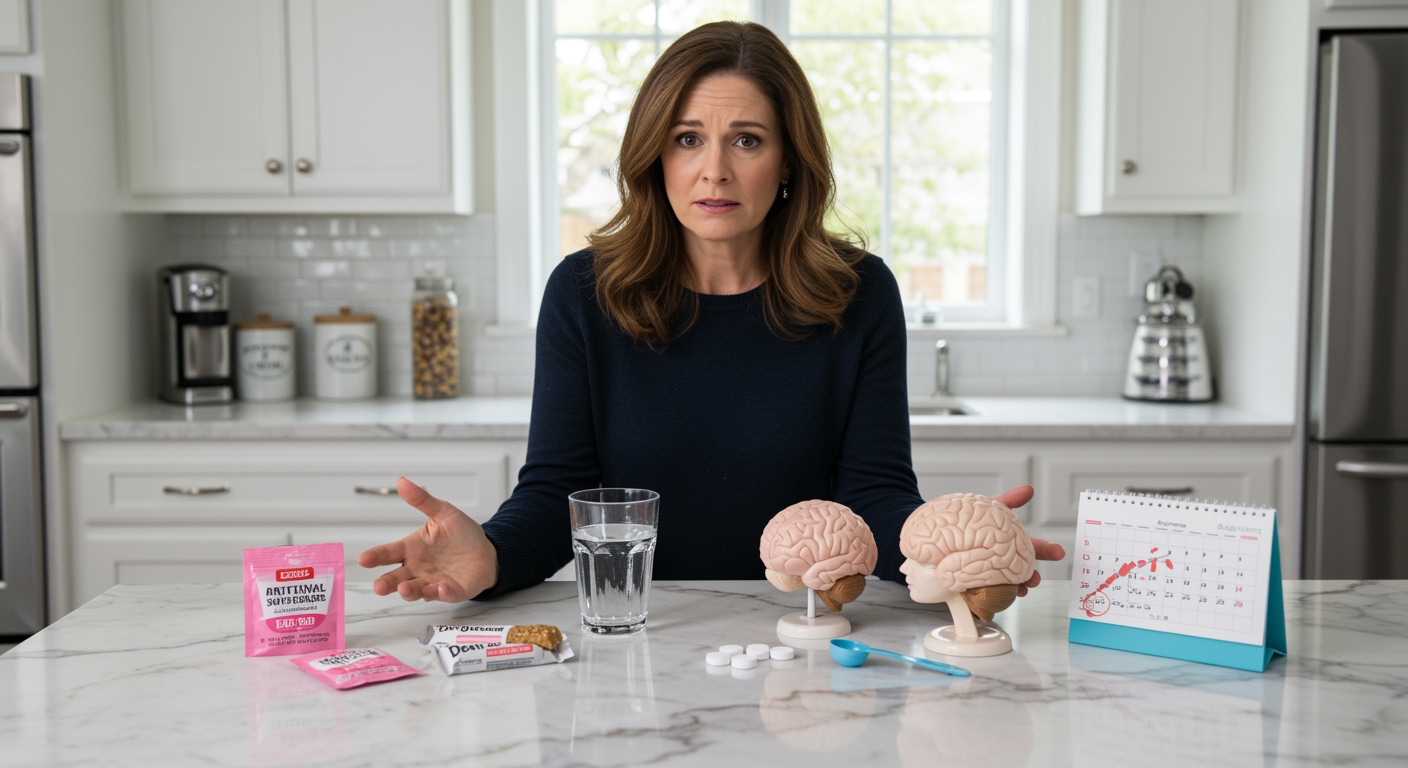✪ Key Highlight: Brazilian study finds artificial sweeteners accelerate cognitive decline by 62% compared to minimal use.
Introduction
Your morning diet soda might be stealing years from your brain.
A groundbreaking study from Brazil tracked nearly 13,000 adults for eight years and discovered that artificial sweeteners accelerate cognitive decline by a shocking 62 percent.
Hi, I’m Abdur, your nutrition coach and today I’m going to analyze this alarming research that links common sugar substitutes to faster brain aging.
What Did The Brazilian Study Actually Find?
Researchers from the University of São Paulo followed 12,800 adults with an average age of 52 for eight years.
Participants completed detailed diet questionnaires that tracked their daily consumption of artificial sweeteners including aspartame, saccharin, acesulfame-K, erythritol, xylitol, sorbitol, and tagatose.
Scientists measured cognitive function using six different tests that assessed thinking and memory skills across three separate time periods.
The results were startling: people consuming the highest amounts of these sweeteners showed 62 percent faster decline in overall cognitive performance.
High consumers averaged 191 milligrams per day while low consumers only had 20 milligrams daily.
This difference translates to approximately 1.6 years of extra brain aging, which represents a significant acceleration in cognitive decline.
The study published in the journal Neurology represents one of the largest long-term investigations into artificial sweeteners and brain health.
✪ Fact: The average American consumes about 24 pounds of artificial sweeteners annually through processed foods and beverages.
Who Faces The Greatest Risk From These Sweeteners?
Middle-aged adults showed the strongest connection between artificial sweetener consumption and cognitive decline.
People with diabetes face particularly high risk because they rely heavily on these sugar substitutes to manage blood glucose levels.
Dr. Claudia Kimie Suemoto, the study’s lead author, explained that diabetic individuals are more likely to use artificial sweeteners as sugar replacements.
This creates a dangerous cycle where those already vulnerable to brain health issues may unknowingly accelerate their cognitive decline.
The research found links to cognitive decline in both diabetic and non-diabetic participants, but the association was stronger among those with existing metabolic conditions.
Adults who regularly consume diet sodas, sugar-free gum, protein bars, and tabletop sweetener packets face the highest exposure levels.
✪ Note: People with diabetes consume up to three times more artificial sweeteners than the general population.
Why Might Artificial Sweeteners Damage Your Brain?
Scientists propose several mechanisms that could explain how artificial sweeteners accelerate cognitive decline.
The body may break down these synthetic compounds into toxic metabolites that directly harm brain cells and neural pathways.
These sweeteners might trigger chronic inflammation in the brain, which is a known contributor to cognitive deterioration and neurodegenerative diseases.
Some artificial sweeteners can cross the blood-brain barrier, potentially disrupting normal neurotransmitter function and cellular communication.
The gut-brain axis may also play a role, as these sweeteners alter gut bacteria composition, which influences brain health through various biochemical pathways.
Additionally, artificial sweeteners may interfere with glucose metabolism in brain cells, reducing their ability to generate energy efficiently.
However, researchers emphasize that this study was observational, meaning it cannot definitively prove that sweeteners directly cause cognitive decline.
✪ Pro Tip: Read ingredient labels carefully as artificial sweeteners hide in unexpected products like medications and vitamins.
What Are The Safer Alternatives To Artificial Sweeteners?
Dr. Suemoto suggests exploring natural sweetening options that may pose fewer risks to brain health.
Applesauce provides natural sweetness along with fiber and antioxidants that support overall health.
Raw honey contains beneficial enzymes and compounds that may offer protective effects, though it should be used in moderation.
Pure maple syrup provides minerals like manganese and zinc while delivering natural sweetness without synthetic additives.
Coconut sugar retains some nutrients from the coconut palm and has a lower glycemic index than regular sugar.
However, these alternatives still require careful portion control as overconsumption of any sweetener can lead to health problems.
The best approach involves gradually reducing your overall sweet taste preference by slowly decreasing sweetener use in foods and beverages.
✪ Pro Tip: Start by reducing sweetener amounts by 25% weekly until your taste buds adapt to less sweetness.
How Should You Respond To This Research?
Dr. Suemoto advises people not to panic but to become more mindful about their artificial sweetener consumption.
Start by tracking how much you consume daily through diet sodas, sugar-free products, and tabletop sweeteners.
Consider gradually reducing your intake rather than making sudden dramatic changes that might be difficult to maintain.
Focus on whole foods that provide natural flavors without requiring additional sweetening agents.
If you have diabetes, work with your healthcare provider to develop a sweetening strategy that balances blood sugar management with potential cognitive risks.
Remember that this research adds to growing evidence about artificial sweetener risks, but more studies are needed to confirm these findings.
The key is making informed choices based on current evidence while maintaining a balanced approach to your overall diet.
✪ Note: This study had limitations including self-reported data and potential confounding factors that require further investigation.
The Bottom Line
This Brazilian study provides compelling evidence that artificial sweeteners may accelerate cognitive decline by 62 percent compared to minimal use.
Your brain health is too precious to gamble with synthetic shortcuts that promise sweetness without consequences.
I would love to hear your thoughts about this research and any questions you might have about reducing artificial sweetener consumption in your daily routine.
References
At NutritionCrown, we use quality and credible sources to ensure our content is accurate and trustworthy. Below are the sources referenced in creating this article:
- Powers Health: Sugar Substitutes Could Be Bad for Brain Aging Study Argues
- PsyPost: Common Artificial Sweeteners Linked to Cognitive Decline in Large Study
- Medical News Today: 7 Sugar Substitutes Linked 62% Faster Decline Thinking Memory Skills Aging
- PubMed: Artificial Sweeteners and Cognitive Decline Research Study
- Neurology Journal: Sugar Substitutes and Cognitive Decline in Middle-Aged Adults





